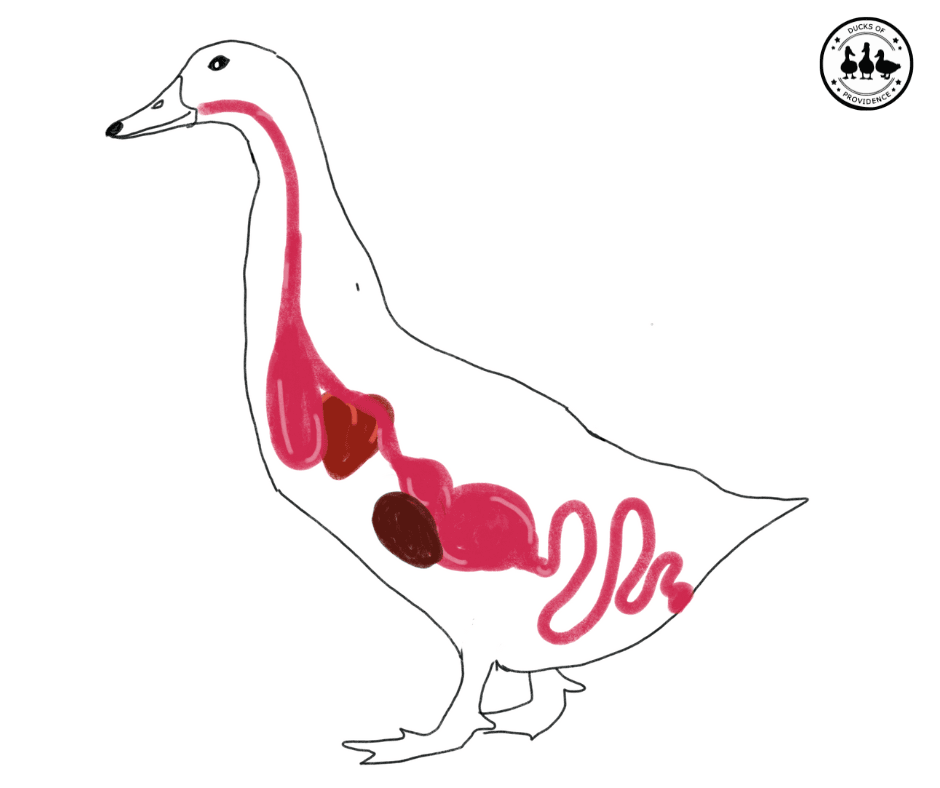
Duck Digestive System Anatomy
Last updated on January 15th, 2026 at 01:29 pm
Ducks are wonderfully unique creatures, and their digestive systems are just as fascinating as their personalities.
Understanding how the duck digestive system works isn’t just for curiosity’s sake — it’s an important part of providing the best care possible for your feathered friends. From how they eat to how they process nutrients, knowing what happens inside your duck can help you spot problems early, choose the right foods, and promote a healthy, happy life.
In this guide, we’ll walk you through the entire duck digestive system — from the first nibble to the final step. Whether you’re a new duck parent or a seasoned keeper, you’ll find everything you need to know right here, backed by research and firsthand experience.
Ducks of Providence is free, thanks to reader support! Ads and affiliate links help us cover costs—if you shop through our links, we may earn a small commission at no extra cost to you. Thanks for helping keep our content free and our ducks happy! 🦆 Learn more
Overview of the Duck Digestive System
Ducks are highly adaptable omnivores, meaning their digestive systems are equipped to handle a wide range of foods — from tender grasses and aquatic plants to insects, snails, and even small fish.
This dietary flexibility is one reason ducks thrive in so many different environments, from backyard ponds to wild wetlands.
Because of their omnivorous nature, the duck digestive system has evolved to be both efficient and versatile:
- Mechanical breakdown happens early, aided by the bill and the gizzard, since ducks do not have teeth.
- Chemical digestion follows quickly, with strong enzymes and stomach acids capable of processing proteins, fats, and fibrous plant material.
- Fermentation in the ceca allows ducks to extract extra nutrients from tougher plant fibers, something strictly carnivorous birds cannot do.
Unlike mammals, ducks cannot chew or regurgitate food to reprocess it (like ruminants or cud-chewing animals). Instead, everything must be mechanically ground and chemically broken down as it moves continuously through their system.
This fast, efficient processing allows ducks to:
- Minimize time spent vulnerable to predators by feeding quickly.
- Quickly gain energy from easy-to-digest foods like bugs and seeds.
- Still benefit nutritionally from harder-to-digest vegetation.
The major parts of the duck digestive system include:
- Bill and mouth
- Esophagus
- Crop
- Proventriculus (glandular stomach)
- Gizzard (muscular stomach)
- Small intestine
- Ceca
- Large intestine
- Cloaca and vent
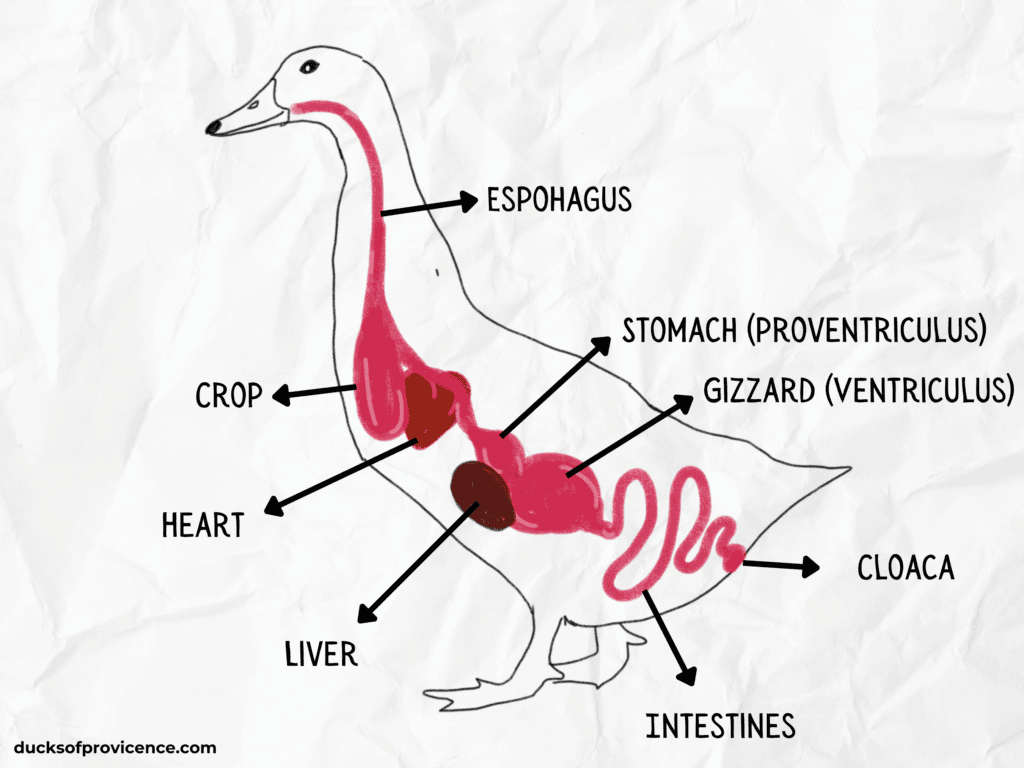
Each part plays a crucial role in making sure your duck gets the nutrients they need to stay healthy.
Step-by-Step Through the Digestive System
1. Bill and Mouth
The digestive journey starts with the duck’s bill and mouth.
Ducks don’t have teeth. Instead, their bills are equipped with lamellae — fine, comb-like structures along the edges. These help filter food from mud, water, and debris. Some breeds, like dabbling ducks, have more pronounced lamellae for foraging in shallow waters.
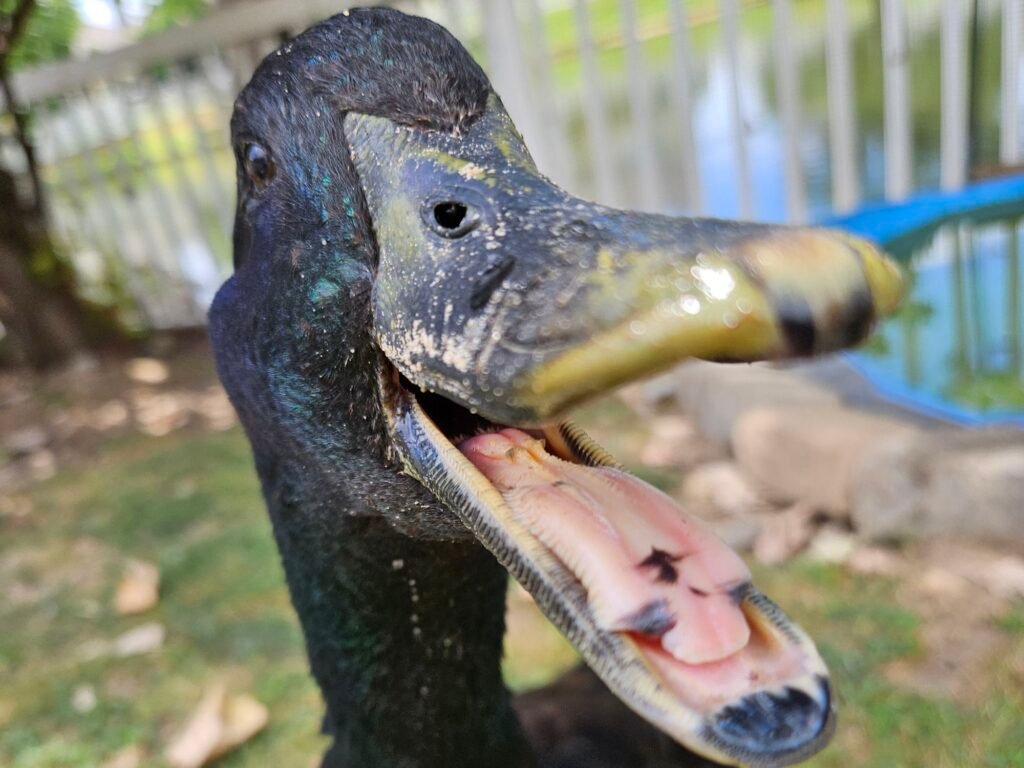
The tongue helps move food toward the throat, and ducks also have a good number of taste buds, although their sense of taste isn’t as refined as ours. Interestingly, ducks prefer certain textures and flavors — something we see daily when offering treats to our own flock!
Key role: Grabbing, filtering, and starting mechanical food breakdown.
2. Esophagus
Once swallowed, food moves down the esophagus — a flexible tube that connects the mouth to the stomach.
In ducks, the esophagus runs slightly to the right side of the neck.
At the entrance to the esophagus is the glottis, a small opening that leads to the trachea (windpipe). It’s important to be aware of this, especially when administering oral medications: accidentally delivering liquids into the trachea can cause aspiration pneumonia, a serious and often fatal condition.
Key role: Safely transporting food toward the crop or stomach.
3. Crop
The crop is a small, expandable pouch located in the lower neck where food can be stored temporarily.
It allows ducks to eat quickly and digest later, a useful trait for a prey animal.
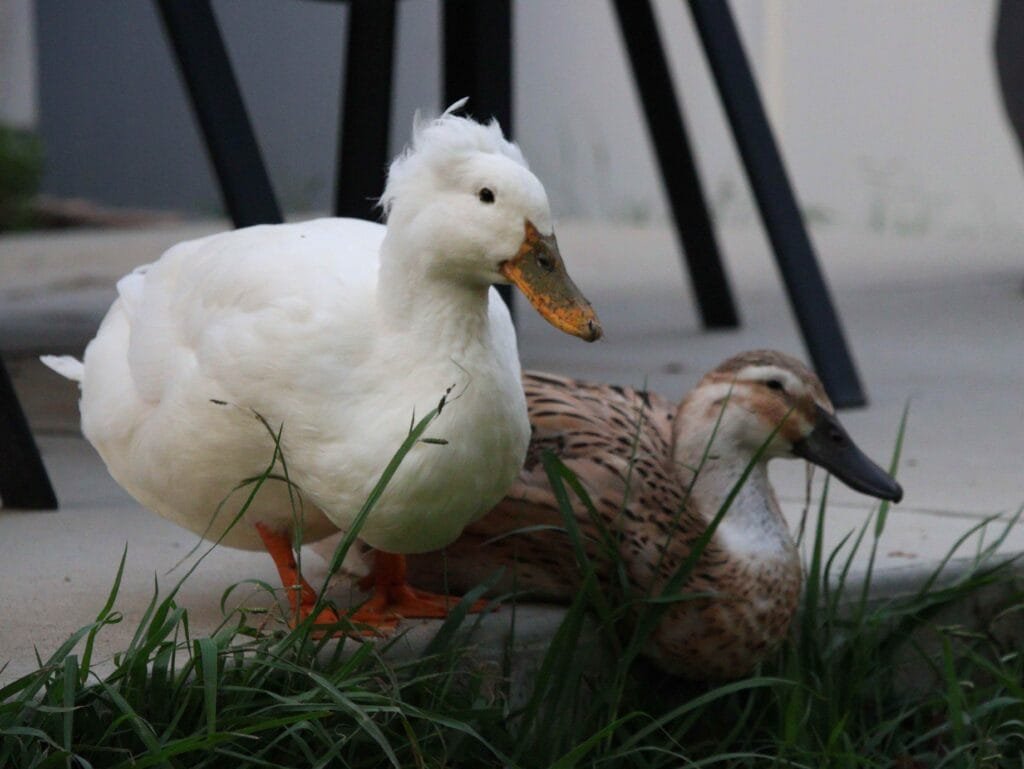
Compared to chickens, ducks tend to have smaller crops relative to their body size. They often rely more directly on immediate digestion rather than long-term food storage.
Key role: Temporary storage of food for later digestion.
4. Proventriculus (Glandular Stomach)
After leaving the crop (or directly from the esophagus if bypassing the crop), food enters the proventriculus — the glandular stomach.
Here, the food is exposed to digestive enzymes and stomach acids that start breaking it down chemically.
Key role: Initiating chemical digestion before mechanical grinding.
5. Gizzard (Ventriculus)
From the proventriculus, food passes into the gizzard.
The gizzard is a strong, muscular organ that grinds food into smaller pieces. Ducks often consume small stones, grit, or sand, which settle in the gizzard and act like grinding tools.
If your ducks eat a commercial pelleted feed, added grit might not always be necessary. However, ducks that forage naturally (eating grasses, bugs, seeds) need access to grit to ensure proper digestion.
Key role: Mechanical breakdown of food with the help of grit.
6. Small Intestine
The pulverized food moves into the small intestine, where most nutrient absorption occurs.
The small intestine has three parts:
- Duodenum: Where bile (from the liver) and pancreatic enzymes are added.
- Jejunum: Main site of nutrient absorption.
- Ileum: Final segment absorbing remaining nutrients.
Key role: Digesting food chemically and absorbing nutrients into the bloodstream.
7. Ceca
At the junction of the small and large intestine are the ceca — two blind-ended sacs.
Food that wasn’t fully digested in the small intestine moves into the ceca for fermentation.
Here, beneficial bacteria help break down fibrous material, and additional water and salts are absorbed.
You may notice a distinctive, smellier, and pastier dropping once or twice a day — that’s a normal cecal dropping!
Key role: Fermentation of undigested materials and absorption of water.
8. Large Intestine (Colon)
After leaving the ceca, the food enters the large intestine (also called the colon).
Unlike mammals, ducks have a relatively short colon. Its main job is to reabsorb water and compact waste.
Key role: Water reabsorption and preparation of waste for elimination.
9. Cloaca and Vent
Finally, everything — digestive waste, urinary waste, and reproductive materials like eggs — passes through the cloaca before exiting the body through the vent.
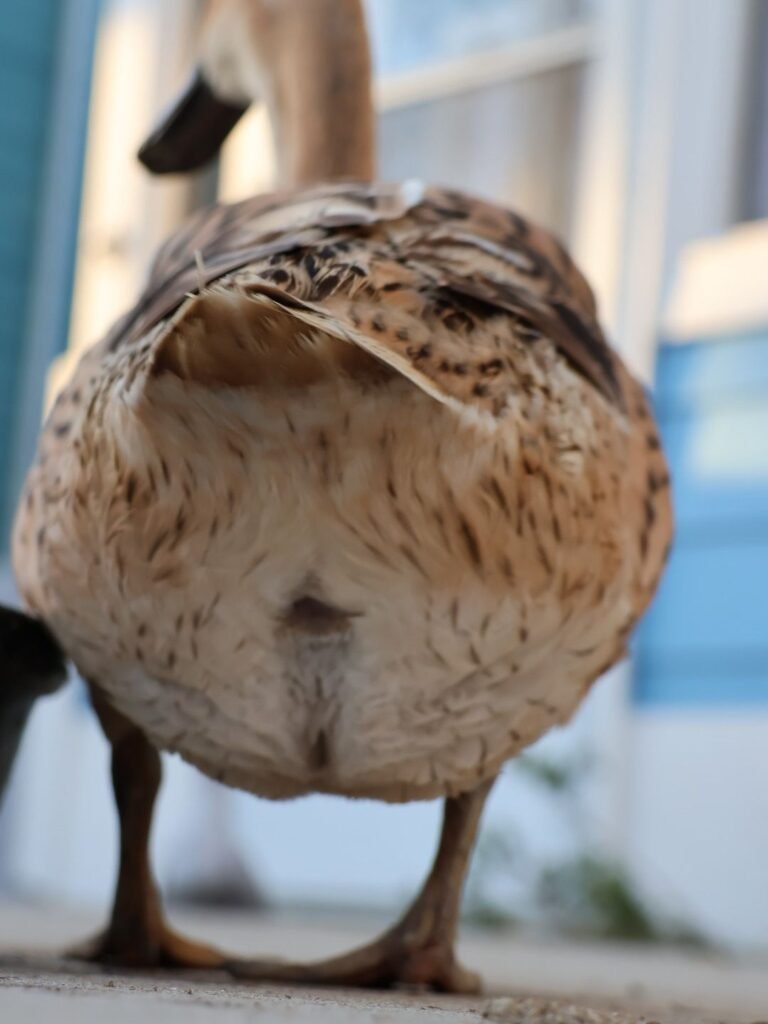
The cloaca is a multi-purpose chamber and an essential part of the duck digestive system, helping streamline different bodily processes into one efficient structure.
Key role: Expelling waste and coordinating reproductive functions.
How Long Does It Take Ducks to Digest Food?
One of the most common questions from new duck parents is:
“How long does it take for ducks to digest their food?”
While the exact timing varies, the average digestive process in a healthy duck takes between 3 and 8 hours from bill to vent.
🕒 A Closer Look at Duck Digestion Timing
| Digestive Stage | Time Range | What Happens |
|---|---|---|
| Crop (if used) | 0–1 hour | Temporary food storage before digestion begins |
| Proventriculus + Gizzard | 1–2 hours | Chemical and mechanical breakdown of food |
| Small Intestine | 2–4 hours | Nutrient absorption with help from bile and enzymes |
| Ceca (fermentation only) | 4–8 hours (selective) | Further breakdown of plant fiber and water absorption |
| Total Transit Time | 3–8 hours | Varies by food type, health, and age of the duck |
What Affects Digestion Speed?
Several factors influence how fast or slow a duck digests food:
- Food type:
Soft, moist foods (like peas or soaked pellets) pass quickly.
High-fiber items like grass or whole grains take longer and may stay in the ceca for extended fermentation. - Age and activity level:
Young, active ducks generally digest faster than older or sedentary ducks. - Environmental temperature:
Cold weather may slow digestion slightly due to reduced metabolic rate. - Water availability:
Ducks need deep water to eat and swallow properly. Without it, digestion can be disrupted.
Why This Matters for Duck Keepers
Understanding the pace of digestion helps you:
- Monitor crop health — it should be full after eating and mostly empty by morning.
- Catch signs of trouble early — a persistently full or hard crop may point to impaction or slow gut motility.
- Time medication and supplements — certain treatments are best given before or after meals, depending on how they absorb.
Understanding Duck Poop Colors
Ducks are famous for their varied — and sometimes shocking — droppings.
It’s completely normal for poop color and consistency to change based on diet, hydration, and even stress. Knowing what’s expected can help you tell the difference between something harmless and something serious.
💩 Common Duck Poop Colors and What They Mean
| Color | Possible Cause | Is It Normal? |
|---|---|---|
| Brown/tan | Mostly commercial feed | ✅ Yes, very normal |
| Light green | After eating lots of peas or greens | ✅ Yes |
| Dark green | Heavier plant-based diet | ✅ Yes |
| Black/blue-black | After blueberries or dark berries | ✅ Yes, though it can look scary! |
| White cap | Uric acid from kidneys (normal in birds) | ✅ Yes |
| Smelly, pasty, tan or brown | Cecal droppings (1–2x/day) | ✅ Yes |
| Neon or bright green | Possible zinc or metal poisoning | ❌ Emergency — call your vet |
| Yellow or foamy | Possible liver issue, infection, or upset | ⚠️ Needs monitoring |
| Bloody or red | Intestinal bleeding, parasites, or injury | ❌ Emergency |
Our Experience: Surprise Black Poop!
We remember how surprised (and a little worried) we were the first time we saw black duck poop — until we realized the flock had just feasted on a handful of blueberries.
Now we always keep recent treats in mind before assuming something is wrong.
When to Be Concerned
- Neon green, bright yellow, or bloody droppings should never be ignored.
- If abnormal poop is paired with signs like lethargy, loss of appetite, or unusual posture, contact an avian vet as soon as possible.
Common Digestive Problems in Ducks
While the duck digestive system is highly efficient, it’s not immune to problems — especially in domestic or backyard environments where ducks may be exposed to unfamiliar foods, hazards, or stressors.
Recognizing early signs of trouble can make a major difference in your duck’s outcome if an issue arises.
Here are some of the most common digestive problems seen in ducks:
Impacted Crop
- What it is: A blockage in the crop that prevents food from moving into the stomach.
- Causes: Eating long grasses, straw, foreign objects (like small pieces of plastic), or lacking sufficient grit.
- Signs: Swollen, hard crop; decreased appetite; lethargy; weight loss.
- What to do: Seek veterinary care. Minor cases sometimes respond to massage and fluid therapy, but more serious cases may need surgical intervention.
➡️ Learn more about Impacted Crop in Ducks
Sour Crop
- What it is: A yeast (often Candida) or bacterial infection in the crop, causing food to ferment rather than pass through properly.
- Causes: Prolonged crop stasis (food sitting too long), poor diet, contaminated water, or a weakened immune system.
- Signs: Foul-smelling breath, sluggish behavior, visibly distended or squishy crop, possible vomiting.
- What to do: Requires antifungal or antibiotic treatment prescribed by a veterinarian. Early detection is critical.
Prolapsed Vent
- What it is: The cloaca or inner tissues protrude outside the vent.
- Causes: Straining from digestive upset, constipation, laying large eggs, or infection.
- Signs: Red, swollen tissue visible at the vent; straining behavior; difficulty pooping or laying.
- What to do: This is an emergency. Keep the tissue clean and moist with a sterile saline solution and seek veterinary help immediately.
➡️ Learn more about prolapsed vent in ducks
Diarrhea
- What it is: Watery or loose droppings beyond the normal occasional cecal poop.
- Causes: Sudden diet changes, infections (bacterial, viral, or parasitic), spoiled food, toxin ingestion, stress.
- Signs: Persistent loose stool, dehydration signs (sunken eyes, lethargy), soiled vent feathers.
- What to do: Identify and correct the underlying cause. Ensure hydration, offer probiotics if recommended by your vet, and monitor closely. Severe or prolonged diarrhea needs veterinary attention.
Metal Poisoning (Especially Zinc and Lead)
- What it is: Toxic ingestion of metals like zinc, lead, or copper — common in backyard environments where screws, nails, coins, and hardware are found.
- Causes: Ducks are naturally curious and forage with their bills, making accidental ingestion of small metal objects a serious risk.
- Signs: Weakness, loss of appetite, greenish diarrhea, drooping wings, neurological symptoms (like tremors or head tilting), or even sudden death.
- What to do: Metal poisoning is a medical emergency. Chelation therapy and supportive care are necessary and must be started as early as possible.
Early intervention is key. Always monitor food intake, crop health, droppings, and overall behavior!
➡️ Learn more about metal poisoning in ducks
Other Less Common Digestive Issues
While the problems listed above are the most frequent, ducks can also occasionally experience other digestive challenges that pet owners should be aware of:
Intestinal Parasites
- What it is: Infection with internal parasites such as roundworms, cecal worms, or coccidia.
- Causes: Exposure to contaminated soil, water, or droppings from wild birds or other infected animals.
- Signs: Weight loss despite normal or increased appetite, diarrhea, general weakness, rough or fluffed-up feathers.
- What to do: Regular fecal exams through your avian vet can catch parasitic infections early. Treatment involves species-specific deworming medications.
Gastrointestinal Infections
- What it is: Bacterial infections like E. coli or Salmonella affecting the digestive tract.
- Causes: Contaminated water sources, spoiled feed, poor hygiene in the coop or run.
- Signs: Severe diarrhea, lethargy, dehydration, loss of appetite, rapid decline in condition.
- What to do: Infections require prompt veterinary diagnosis and antibiotic treatment. Supportive care such as fluid therapy may be necessary.
Intestinal Blockages
- What it is: Obstruction of the intestines due to ingestion of indigestible or stringy materials (e.g., synthetic fibers, long grass, hair, or foreign objects).
- Causes: Curiosity-driven ingestion, especially in ducks allowed to forage unsupervised.
- Signs: Straining to defecate, lack of droppings, bloated abdomen, lethargy, reduced appetite.
- What to do: This is an emergency. Blockages typically require veterinary intervention, and in severe cases, surgery to remove the obstruction.
Preventive Care Tip
- Always supervise free-ranging where possible.
- Offer proper, balanced nutrition to support gut health.
- Keep the living environment clean, dry, and free of foreign objects.
- Maintain a regular schedule for wellness checks and fecal testing.
How to Support Healthy Digestion
A healthy duck’s digestive system starts with proactive care.
Many common digestive issues can be prevented through good nutrition, proper management, and a clean living environment.
Here’s how you can support your ducks’ digestive health every day:
1. Feed a Balanced, Age-Appropriate Diet
- Starter feeds for ducklings, grower feeds for adolescents, and maintenance or layer feeds for adults are carefully formulated to meet specific nutritional needs.
- Choose a feed made specifically for ducks when possible, or supplement chicken feed with extra niacin (vitamin B3), which is essential for proper metabolism and digestion.
- Avoid feeding moldy, spoiled, or old food, as this can introduce harmful bacteria or mycotoxins.
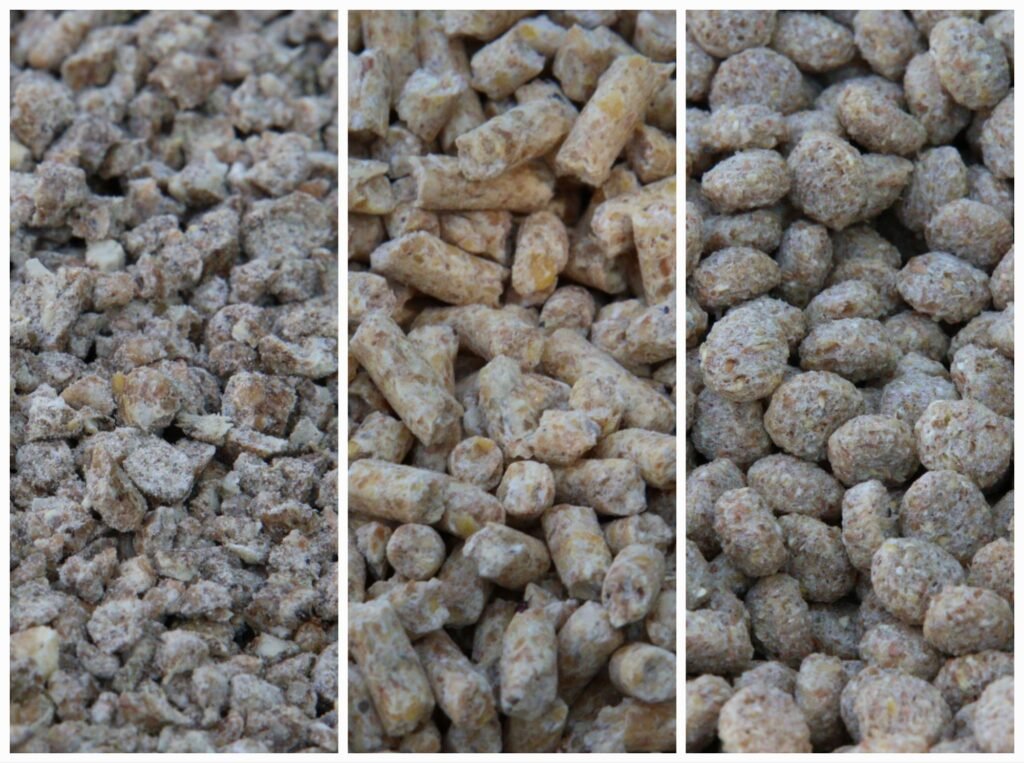
➡️ Learn more about commercial duck feed for ducks and nutritional needs
2. Provide Access to Grit
- Ducks that forage or eat whole grains, vegetables, and insects need grit (small, insoluble stones) to help grind food in the gizzard.
- Offer chick grit for ducklings and grower or adult grit for older ducks.
- If your ducks eat only commercial pelleted feed, additional grit may not be necessary — but it’s still a good idea to offer it free-choice, especially foraging ducks.
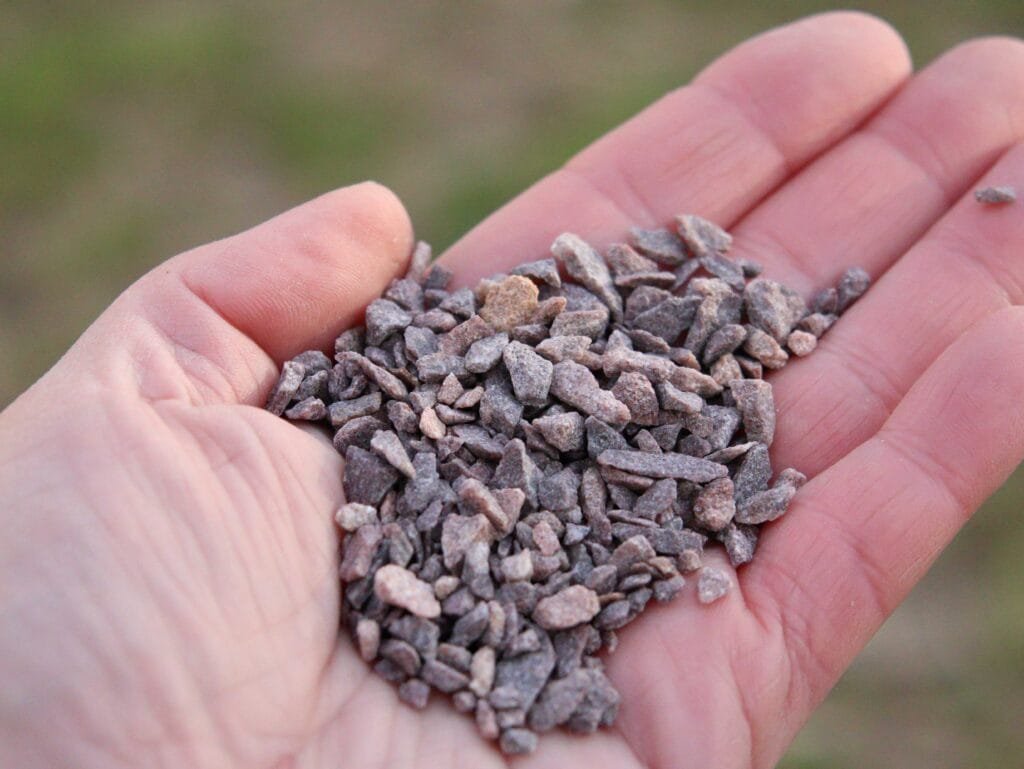
➡️ Learn more about Grit for ducks
3. Ensure Clean, Deep Water
- Ducks must have constant access to clean water deep enough for them to submerge their entire bills.
- Water helps moisten food for swallowing, clears the nostrils, and supports digestion by allowing proper food movement through the esophagus and crop.
- Tip: Refresh water sources daily, and scrub water containers regularly to prevent bacterial buildup.
4. Support Gut Health with Natural Foraging and Probiotics
- Allowing ducks to forage safely offers natural dietary diversity that strengthens gut flora.
- Feeding probiotic supplements (specifically those safe for poultry like Hydro-Hen or Vitametz) can help maintain a healthy balance of beneficial bacteria, especially after illness, stress, or antibiotic treatment.

5. Monitor Droppings and Behavior
- One of the earliest signs of digestive trouble is a change in droppings:
- Watery, discolored, excessively foul-smelling, or bloody droppings may indicate a problem.
- Pay attention to eating habits, crop size at different times of day, and general energy levels.
- Normal cecal droppings (thicker, pastier, smellier) should occur about once daily — don’t mistake them for diarrhea unless they become overly frequent or persistent.
6. Keep the Environment Safe and Clean
- Remove small metal objects, string, rubber bands, and anything else that could be accidentally ingested.
- Keep bedding dry to prevent mold and parasites from thriving.
- Protect feed from wild birds and rodents to reduce disease risk.
7. Transition Diet Changes Slowly
- Ducks’ digestive systems need time to adjust to new foods.
- Introduce any dietary changes (new feed, treats, greens) gradually over 7–10 days to prevent upsetting the delicate gut flora.
Bonus Tip:
If you ever need to offer treats, keep them healthy!
Always keep treats to less than 10% of the overall diet to avoid imbalances that can impact digestion.
Recommended treats include chopped leafy greens, peas, corn, mealworms, or diced cucumbers.
Final Thoughts
The duck digestive system is a fascinating and finely tuned process — one that reflects how adaptable, efficient, and resilient these birds truly are.
From filtering food through their bills to extracting nutrients in their ceca, ducks are built to thrive on a diverse diet. But as pet duck keepers, it’s our job to support that natural system with the right food, clean water, and a safe environment.
Understanding how your duck digests food isn’t just science — it’s a way to be a more attentive and informed duck parent.
From knowing what normal poop looks like (even the surprisingly black kind after blueberries!) to recognizing the signs of crop trouble or metal poisoning, the more you know, the better prepared you are to care for your flock.
We’ve learned through our own ducks — like Krümel, who faced zinc toxicity — just how quickly things can change. But we’ve also seen how resilient ducks can be with the right care. So trust your instincts, keep observing, and don’t hesitate to seek help when something feels off.
Your ducks rely on you — and with the knowledge you now have, you’re well on your way to giving them a healthier, happier life.
